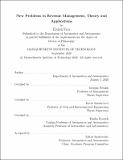New problems in revenue management, theory and applications
Author(s)
Fata, Elaheh.
Download1227276880-MIT.pdf (2.711Mb)
Other Contributors
Massachusetts Institute of Technology. Department of Aeronautics and Astronautics.
Advisor
Georgia Perakis and David Simchi-Levi.
Terms of use
Metadata
Show full item recordAbstract
This thesis studies new applications of revenue management that can be used by airlines and the ride-sharing industry. Our first and main focus is on online advertising with applications to advertisement of flight tickets. Moreover, the last chapter studies an online ride-sharing problem in which both drivers and riders appear on the platform in an online manner and the goal is to find the best matchings between the two parties. More specifically, Chapter 2 studies an online advertising problem, from the perspective of the advertiser, whose goal is to determine the best set of targets to show their ads to. We develop new algorithms that help advertisers, such as airline companies, to bid optimally on target portfolios while taking into account some limitations inherent to online advertising. In this work, we formulate the problem and develop an Optimistic-Robust Learning (ORL) algorithm that uses ideas from Upper Confidence Bound (UCB) algorithms and robust optimization. We prove that the expected cumulative regret of the algorithm is bounded. Additionally, simulations on synthetic and real-world data show that the ORL algorithm reduces regret by at least 10-20% compared to benchmarks. Chapter 3 studies an assortment optimization problem where a customer chooses a single item from a sequence of non-overlapping sets shown to her, while limited inventories constrain the items offered to a sequence of customers over time. An example of this is selecting a flight ticket among the options provided by a travel booking website. In the special case where all of the assortments have size one, we derive an approximation algorithm which earns at least 1 - ln(2 - 1/e) of the optimum. For the general assortment problem, we establish the first constant-factor approximation ratio of 0.09 when revenues are customer specified and 0.15 otherwise. Similarly, Chapter 4 studies an online advertisement problem with the goal of determining which products to show to each customer while respecting important online advertising business rules. More specifically, customers appear throughout time and the advertiser's goal is to determine which product (e.g., a flight ticket) to show to her while avoiding ad fatigue and respecting a set of diversity constraints on products. We study this problem under online and offline settings. Finally, Chapter 5 studies an online optimization problem with applications to ridesharing. The problem can be modeled as a bipartite graph, where one side is associated to drivers and the other side to riders. For this problem, we have optimal matching algorithms for the case of bipartite graphs with degrees at most 2 as well as bounds on competitive ratios for trees.
Description
Thesis: Ph. D., Massachusetts Institute of Technology, Department of Aeronautics and Astronautics, September, 2020 Cataloged from student-submitted PDF of thesis. Includes bibliographical references (pages 215-220).
Date issued
2020Department
Massachusetts Institute of Technology. Department of Aeronautics and AstronauticsPublisher
Massachusetts Institute of Technology
Keywords
Aeronautics and Astronautics.